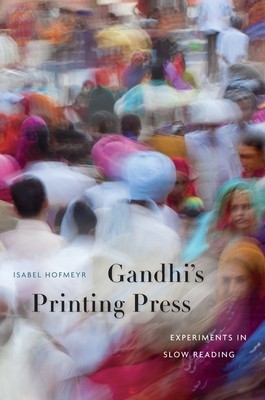
- We will send in 10–14 business days.
- Author: Isabel Hofmeyr
- Publisher: Harvard
- ISBN-10: 0674072790
- ISBN-13: 9780674072794
- Format: 14.2 x 21.1 x 2.3 cm, kieti viršeliai
- Language: English
- SAVE -10% with code: EXTRA
Reviews
Description
At the same time that Gandhi, as a young lawyer in South Africa, began fashioning the tenets of his political philosophy, he was absorbed by a seemingly unrelated enterprise: creating a newspaper. Gandhi's Printing Press is an account of how this project, an apparent footnote to a titanic career, shaped the man who would become the world-changing Mahatma. Pioneering publisher, experimental editor, ethical anthologist--these roles reveal a Gandhi developing the qualities and talents that would later define him.
Isabel Hofmeyr presents a detailed study of Gandhi's work in South Africa (1893-1914), when he was the some-time proprietor of a printing press and launched the periodical Indian Opinion. The skills Gandhi honed as a newspaperman--distilling stories from numerous sources, circumventing shortages of type--influenced his spare prose style. Operating out of the colonized Indian Ocean world, Gandhi saw firsthand how a global empire depended on the rapid transmission of information over vast distances. He sensed that communication in an industrialized age was becoming calibrated to technological tempos.
But he responded by slowing the pace, experimenting with modes of reading and writing focused on bodily, not mechanical, rhythms. Favoring the use of hand-operated presses, he produced a newspaper to contemplate rather than scan, one more likely to excerpt Thoreau than feature easily glossed headlines. Gandhi's Printing Press illuminates how the concentration and self-discipline inculcated by slow reading, imbuing the self with knowledge and ethical values, evolved into satyagraha, truth-force, the cornerstone of Gandhi's revolutionary idea of nonviolent resistance.
EXTRA 10 % discount with code: EXTRA
The promotion ends in 22d.17:53:45
The discount code is valid when purchasing from 10 €. Discounts do not stack.
- Author: Isabel Hofmeyr
- Publisher: Harvard
- ISBN-10: 0674072790
- ISBN-13: 9780674072794
- Format: 14.2 x 21.1 x 2.3 cm, kieti viršeliai
- Language: English English
At the same time that Gandhi, as a young lawyer in South Africa, began fashioning the tenets of his political philosophy, he was absorbed by a seemingly unrelated enterprise: creating a newspaper. Gandhi's Printing Press is an account of how this project, an apparent footnote to a titanic career, shaped the man who would become the world-changing Mahatma. Pioneering publisher, experimental editor, ethical anthologist--these roles reveal a Gandhi developing the qualities and talents that would later define him.
Isabel Hofmeyr presents a detailed study of Gandhi's work in South Africa (1893-1914), when he was the some-time proprietor of a printing press and launched the periodical Indian Opinion. The skills Gandhi honed as a newspaperman--distilling stories from numerous sources, circumventing shortages of type--influenced his spare prose style. Operating out of the colonized Indian Ocean world, Gandhi saw firsthand how a global empire depended on the rapid transmission of information over vast distances. He sensed that communication in an industrialized age was becoming calibrated to technological tempos.
But he responded by slowing the pace, experimenting with modes of reading and writing focused on bodily, not mechanical, rhythms. Favoring the use of hand-operated presses, he produced a newspaper to contemplate rather than scan, one more likely to excerpt Thoreau than feature easily glossed headlines. Gandhi's Printing Press illuminates how the concentration and self-discipline inculcated by slow reading, imbuing the self with knowledge and ethical values, evolved into satyagraha, truth-force, the cornerstone of Gandhi's revolutionary idea of nonviolent resistance.


Reviews